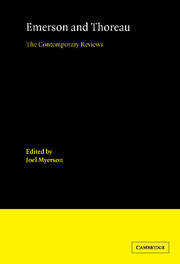Book contents
- Frontmatter
- Contents
- Series Editor's Preface
- Introduction
- RALPH WALDO EMERSON
- Nature (1836)
- “The American Scholar” (1837)
- “Divinity School Address” (1838)
- “Literary Ethics” (1838)
- Essays [First Series] (1841)
- “The Method of Nature” (1841)
- Essays: Second Series (1844)
- Poems (1847)
- Essays, Lectures, and Orations (1847)
- Nature; Addresses, and Lectures (1849)
- Representative Men (1850)
- English Traits (1856)
- The Conduct of Life (1860)
- May-Day and Other Pieces (1867)
- Society and Solitude (1870)
- Letters and Social Aims (1876)
- HENRY DAVID THOREAU
- RETROSPECTIVE ESSAYS BY CONTEMPORARIES
- Index
Essays, Lectures, and Orations (1847)
Published online by Cambridge University Press: 23 March 2010
- Frontmatter
- Contents
- Series Editor's Preface
- Introduction
- RALPH WALDO EMERSON
- Nature (1836)
- “The American Scholar” (1837)
- “Divinity School Address” (1838)
- “Literary Ethics” (1838)
- Essays [First Series] (1841)
- “The Method of Nature” (1841)
- Essays: Second Series (1844)
- Poems (1847)
- Essays, Lectures, and Orations (1847)
- Nature; Addresses, and Lectures (1849)
- Representative Men (1850)
- English Traits (1856)
- The Conduct of Life (1860)
- May-Day and Other Pieces (1867)
- Society and Solitude (1870)
- Letters and Social Aims (1876)
- HENRY DAVID THOREAU
- RETROSPECTIVE ESSAYS BY CONTEMPORARIES
- Index
Summary
It is impossible to mistake the tendency of our times, and of our country especially. This is a period of intellectual decline. Mind, in our generation, has lost its daring, its power, and its grasp, its originality, its self-reliance, its lofty aspirations, its individuality; and enfeebled and timid, it finds occupation in false sentimentalism, or a material philosophy, of which selfishness is the principle, and £ s. d. the sum. As Wordsworth says, “The world is too much with us.”
The proofs are patent where they would most readily be found—in our literature. Philosophy in its loftiest form is extinct among us. Poetry, which is philosophy revealing itself in language intelligible to the work-day world, can find no listeners. The periodical press, which faithfully reflects the popular taste, sedulously shuns either topic. Every day, more and more are they compelled to cater for the amusement of their readers, and to avoid anything that has the form, or even the substance, of instruction. The only writings that reward their authors, because the only works that find an extensive sale, are exciting romances, jest-books, and illustrated works—publications which either kindle the passions, or create a laugh, or please the eye, and impose no labour on the understanding; and stir not up the mind to the task of thought. Of the numerous periodicals published in Great Britain, The Critic alone devotes the slightest attention to the highest branches of human knowledge—the divinest efforts of the immortal spirit that our age is striving to bind and chain to earth—the Mental Philosophy which is really the most grovelling calculations of utility, and the Philosophy of Being, which, if it do no more than lift us nigher to God, is entitled to some notice from those who profess to guide the age, though, in fact, they but reflect it.
- Type
- Chapter
- Information
- Emerson and ThoreauThe Contemporary Reviews, pp. 190 - 193Publisher: Cambridge University PressPrint publication year: 1992
- 1
- Cited by



